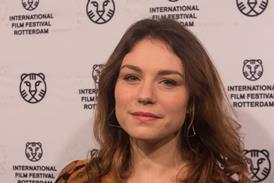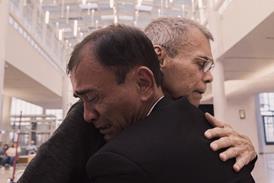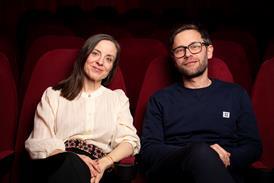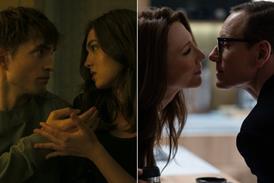Producers Karsten Stöter, Liz Watts and Paul Welsh talk about working with acclaimed Australian director Cate Shortland on her German-language project Lore.
Synopsis: In spring 1945, the German army collapses. As the Allied forces sweep across the Motherland, five children embark on a journey which challenge every notion we have of family, love and friendship.
Director: Cate Shortland
Writers: Cate Shortland, Robin Mukherjee
Producers: Karsten Stöter and Benny Dreschsel (Rohfilm, Germany) Liz Watts (Porchlight Film), Paul Welsh (Edge City Films)
Production Companies Rohfilm (Germany), Porchlight Film (Australia), Edge City Films (UK)
Cast: Saskia Rosendahl plays the title role of Lore, Nele Trebs is her sister Liesl, Kai Malina plays Thomas, and Hans-Jochen Wagner is Lore’s father
Financing: Mitteldeutsche Medienförderung/MDM (€500,000), HessenInvestFilm (€425,000), German Federal Film Board/FFA (€ 250,000), Filmförderung Hamburg Schleswig-Holstein/FFHSH (€ 200,000), MFG Baden-Württemberg (€200,000), German Federal Film Fund/DFFF (€442,151), Screen Australia, Screen New South Wales (A$275,000) and Creative Scotland
Countries of Production: Germany, Australia
Shooting locations: Görlitz, Baden-Württemberg, Hessen and in Schleswig-Holstein
Shooting dates: 38 shooting days from July 19 to Sept 14, 2011
International sales: Memento Films International
Distribution: Germany (Piffl Medien), Australia and New Zealand (Transmission Films), France (Haut et Court)
Release date: 2012
On the idea of adapting Rachel Seiffert’s novel The Dark Room
Paul Welsh: I first read the manuscript for Lore in 1999. The visual style of Rachel Seiffert’s writing combined with the history, politics and emotional intensity of the story all shouted cinema to me. In the years prior to writing The Dark Room — Lore forms the middle section of the novel — Rachel worked as a film editor and she had also written and directed a couple of short films in Scotland. I think this experience shaped the style of her prose quite directly. When Lore was published in 2001, it was Booker nominated in the UK and immediately received a lot of attention from producers. But with her experience in film, Rachel was wary about adaptations and let things cool down a bit. We continued to discuss the possibilities on and off for a couple of years before she finally agreed that Edge City Films could option the material in 2004.
Karsten Stöter: I met Paul Welsh and the project Lore in 2005 at the European producers’ training programme EAVE. I was interested right away because the story was told through the prism of a 14-year old girl, old enough to understand what happened, but too young to be really guilty. This kind of ambivalent perspective is not common in German films about the Second World War and the Holocaust and challenging for some people here.
On choosing Cate Shortland as the director for Lore
Welsh: Around the time Lore moved into development, Somersault was one of the buzz titles at Cannes [in 2004]. I missed the film in France, so I made sure I saw it at my home festival, EIFF. Cate presented it in Edinburgh and, one evening, we were randomly introduced by Peter Carlton, then of Film 4.
When I first watched Somersault, I enjoyed two things in particular. Cate wasn’t doing black and white. She was operating in areas were you could love and hate her characters, respect and despise them, at the same time. Somersault did this very well and Lore’s completely defined by this type of emotional contradiction for character and audience alike. So, on a fundamental level, I thought Cate would respond well to the material in Lore. The second thing I enjoyed about Cate’s writing and directing was its rich sensuality. During Somersault, I felt like I was up there in the Blue Mountains. For our film to work, the audience needs to feel like it’s crossing Germany with Lore and her siblings, blisters and all.
On the challenge of shooting in German
Liz Watts: The distance of a non-native speaker director from the subject didn’t really phase me. But it did mean that it was hugely important that the film be in the German language. We were concerned with the detail of history very much in this film because its so confronting, so enthrallingly complex. It always meant we had to be spot on with historical accuracy, but open to the creative characterisation of this particular story. So - yes - its been tricky.
Welsh: Between 2005 and 2008, the first couple of drafts of Lore were written by Robin Mukherjee (Dance of The Wind) and during this period, Cate made it clear she would only direct Lore in German. We were all together on a research trip to Berlin when she said it and I knew she was right. But now I had a really massive challenge on my hands. The subject matter was already tough and now I had to convince people Cate could direct children in a foreign language, in a period setting. And the German-language decision immediately slashed the possibilities for UK finance. Creatively, it was obviously the right decision to make but pragmatically, most people thought it was producer suicide. From that point forward, I had to find strong partners capable of raising the majority of the budget outside the UK. There was no other way to make Lore. It was a difficult adjust, but I accepted it.
On casting the central role of Lore
Stöter: It was a long process. We looked at all the girls in the children agencies, school drama classes and also did street castings in various German town and regions. We collaborated with the experienced children casting agent Jacqueline Rietz. And, funnily enough after several months of searching, we ended up with a girl who is in Jacqueline’s own agency.
Watts: Cate saw many many girls for the central role, and the element of age and the nature of an arduous shoot meant it vital the central character was cast right. Saskia Rosendahl, I do believe, will be a star - she is quite amazing in the role of Lore, surrounded by a brilliant young cast playing her siblings like Nele Trebs, and the other central role of Thomas, played by Kai Malina. The entire ensemble of cast has many faces we hope an audience will recognise- such as Ursina Lardi who plays Lore’s mother.
Welsh: It was a great to watch Saskia deliver her final audition. She literally turned every head in the room with her power. After spending so long with the children on the page, this was really exhilarating for me.



















No comments yet